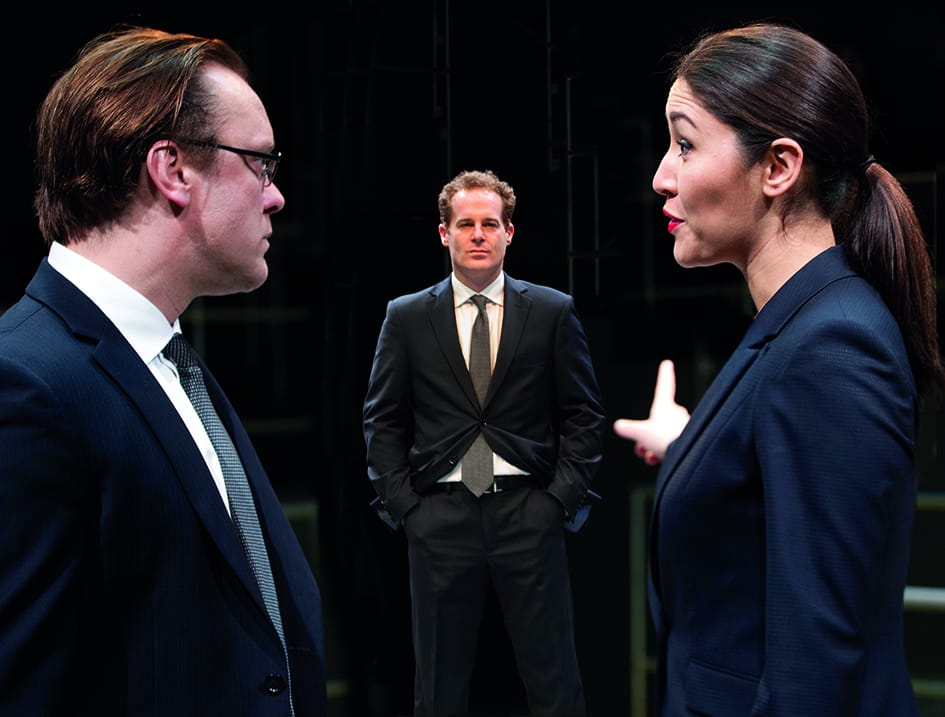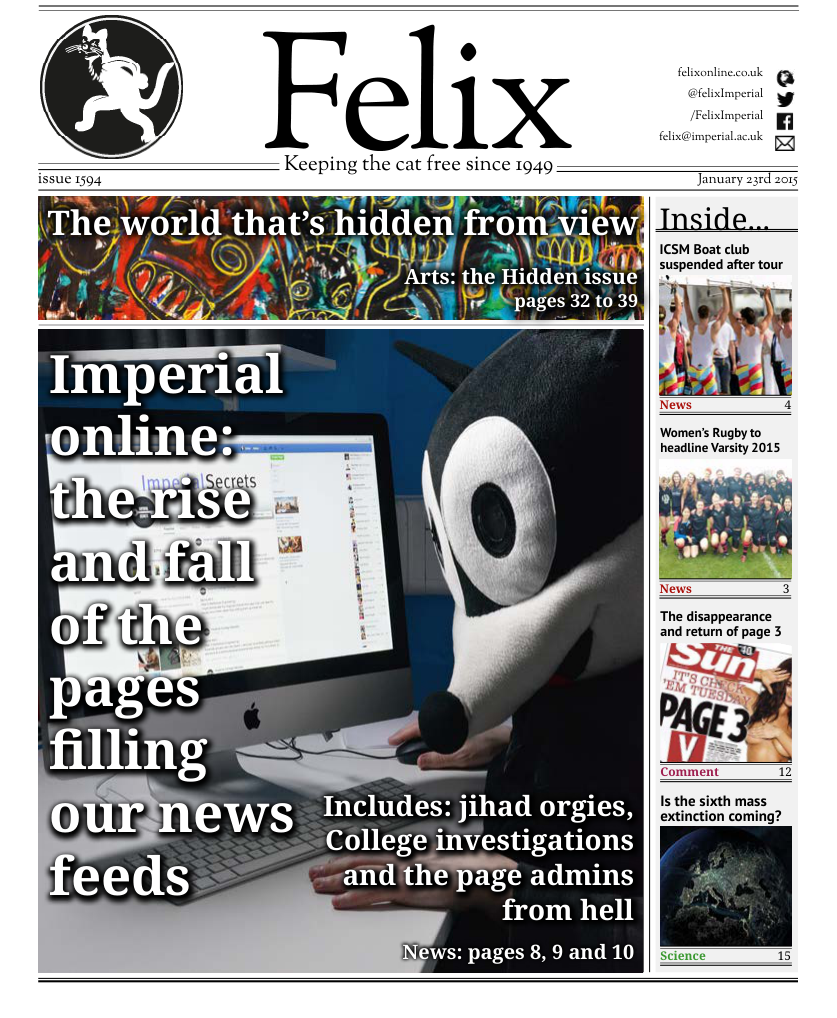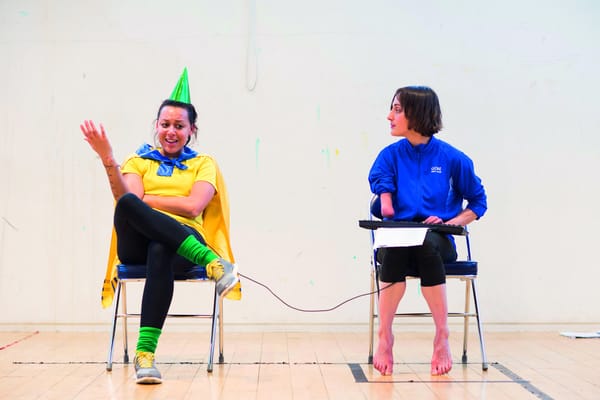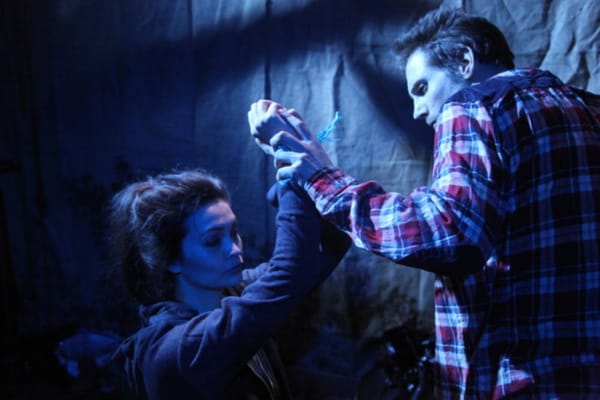A Fight to the Death in the World of Office Politics
Fred Fyles explains how Young Vic’s Bull misses the target in places

Three people enter. Two people leave. Anyone who is familiar with the BBC show The Apprentice, in which a collection of terminally unlikable corporate drones are paraded in front of the camera, will be familiar with this format; every week a contestant is sent packing, the grizzly tones of Sir Alan’s catchphrase “You’re fired” still ringing in their ears. In the Young Vic’s latest production Bull, this format is brought to the stage, and we are presented with a similar dilemma.
With the recession causing their company to downsize, three office workers must compete for the two jobs that will remain after (in business jargon-speak) the ‘restructuring’. Over the course of a mere 55 minutes, we watch as simple power plays – ‘Why aren’t you wearing your nice suit?’ – turn to something much more sinister, with two corporate sharks ripping apart their limp colleague.
Sam Troughton plays Thomas, the unfortunate pawn in this game of social Darwinism; with his receding hairline, wire-frame glasses, and slightly-too-tight shirt that does little to hide a developing paunch, Thomas is a difficult character to like, let alone sympathise with. Sweating under the stage lights like a televised Richard Nixon, Thomas is like a deer in the headlights before his colleagues: the stereotypical high-flying ice-queen Isobel (Eleanor Matsuura) and the horrifically ‘alpha’ Tony (Adam James), described as a person who “runs marathons to sleep with the charity workers”.
While Bull is certainly a strong play, there is a feeling that something is missing
Slowly and surely, subtle digs and misinformation turn into something much darker, with a clear conspiracy emerging between Tony and Isobel; Thomas can only watch as any chance he had of remaining in the job slips away from him (this isn’t a spoiler – the game is fixed from the very beginning). Troughton plays the part with aplomb, his desperation eventually spilling over into sheer physicality as he charges around the stage. However, while his performance is simultaneously heart-breaking and revolting, there are moments where the dialogue feels slightly stilted; in some parts of the play, what should be lightning-quick witticisms are delivered somewhat laconically, disrupting the tensions.
That being said, as individuals, all the actors are fantastic; even Neil Stuke, whose role as the CEO amounts to little more than a cameo, manages to imbue his short time on stage with a sense of sadistic power. Special mention, however, must go to Matsuura, who inhibits her character with a cold, clear-cut sensibility; quite the opposite of Troughton’s bumbling stature, she manages to maintain a ramrod posture throughout the performance, heightening her frigid physicality. It is also Matsuura who delivers the stunning closing monologue, giving a bravura performance in which she remorselessly shreds any dignity that Thomas was clutching onto.
Director Clare Lizzimore, working with designer Soutra Gilmour, has made the bold choice of presenting the action in a boxing ring; in one corner ominously sits a monolithic water cooler, while the audience is divided into tiered spaces, both seated and standing. This gives us a much greater sense of a spectacle, and also makes us somewhat complicit in the torturing of Thomas; as observers we are also collaborators, especially when barbarous taunts are flung from Isobel and Tony. We really shouldn’t be laughing at such a pathetic creature as Thomas, but Mike Bartlett’s witty script makes it difficult to resist.
Oscillating between mounting suspense and outré moments
Ultimately, while Bull is certainly a strong play, held up by a terrific small cast, there is a feeling that something is missing.
Before the play starts, while the audience is assembling, loudspeakers blare out Frankie Goes To Hollywood’s Two Tribes, and Survivor’s Eye of the Tiger, psyching up the audience in a way that the play never quite lives up to. Whilst watching, I was reminded of two similar plays, which tackle the same themes: firstly Yasmina Reza’s God of Carnage, in which two sets of suburban parents try and settle a dispute between their sons, but end up drunkenly hurling insults at each other; and secondly Lucy Prebble’s Enron, which exposes those responsible for the Enron scandal of the early-noughties.
Whilst Reza’s work bristles with a slowly mounting tension, Prebble’s sacrifices tension and reserve for larger-than-life characters, who become horrific near-caricatures of actual financiers (although, the play is that much more chilling because even then the characters are completely believable). _Bull _tries to do both, oscillating between a mounting suspense and outré moments in which the characters are unbelievably revolting. As a result, we never really get a full picture of what is trying to be done; are things supposed to be tense, or horrifically comic? At one point, a bit of dialogue about sexual abuse gives us hope – if that is the right word – that things will take a much darker turn; but then this is simply dropped, and never mentioned again. Rather than charging around in the dark, Bull would surely be better if it had a clear target and vision that it could aim for. Despite the great cast and the innovative direction, it is difficult not to get the sense that something more could be done with the plot to elevate it beyond a simple tale of office politics.









